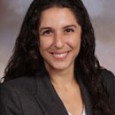
From left: Pro-bono attorney Khari Tillery, NCIP attorney and Assistant Clinical Professor Paige Kaneb, and client Zavion Johnson
SANTA CLARA, Calif., Dec. 8, 2017— Thanks to new scientific knowledge about Shaken Baby Syndrome, a man wrongfully convicted in 2002 of killing his 4-month-old daughter has had his conviction reversed after spending nearly 17 years in prison. The San Francisco law firm Keker, Van Nest & Peters and the Northern California Innocence Project (NCIP) at Santa Clara University School of Law brought forth the new evidence, which reflects updated knowledge about the causes of Shaken Baby Syndrome and the risk of parents improperly being charged with murder in cases of household accidents.
The California Superior Court of Sacramento reversed Zavion Johnson’s murder conviction, which occurred when he was 18 years old. In what he has always claimed was a tragic accident, Johnson’s daughter, Nadia, slipped from his arms and fell in the bathtub while Johnson was bathing her. She later died from internal injuries.
Despite 15 witnesses including Nadia’s mother, testifying that Johnson was a loving, caring father, medical experts at the time cited the then-medical consensus that the only possible explanation for Nadia’s injuries and death involved Shaken Baby Syndrome.
Jurors called the medical evidence “overwhelming,” and sentenced him to life in prison, even though, as one juror recollected, they “felt that Zavion Johnson was a good young man, very loving to his girlfriend and their baby girl, and that it would seem horribly out of character for him to murder his baby.” The juror went on the say, “without that evidence, we certainly would not have convicted Zavion Johnson.”
Using modern science, medical experts, including the original pathologist that testified at Johnson’s trial, have since reviewed the case. The experts agree that Nadia’s injuries are consistent with the fall originally described by Johnson 17 years ago and they can no longer say it was abuse. According to Khari Tillery, a partner at Keker, Van Nest & Peters, “the expert medical testimony presented at trial has been undermined and there is now medical consensus that an accidental short fall onto a hard surface can cause this type of head injury.” He went on to say, “while nothing can give him back the 17 years he spent in prison for a crime he did not commit, we are grateful to the Court and the prosecutor for recognizing this injustice.”
Now, awaiting his release, Johnson is planning his life outside of the prison walls he has called home for half of his life. “I’m hoping for a positive future – for my life to begin.” While nothing can bring back his daughter, or the time he has lost, he looks forward to finally being able to grieve and build a life.
“Zavion is one of the most gentle, caring, and thoughtful people I have ever met and society will be a better place the moment he re-joins it,” said NCIP attorney Paige Kaneb.
Johnson has been released on his own recognizance pending the district attorney’s decision whether to retry his case.
About Shaken Baby Syndrome
Shaken Baby Syndrome (SBS) is diagnosed based on three intracranial findings (bleeding behind the eyes and in the dural membrane over the brain and brain swelling) that were once believed to be evidence of abuse or extreme accidents like car crashes, but science has since proven they are also found in the context of household accidents and medical conditions. In 2015, The Medill Justice Project from Northwestern University cited that there were more than 3,000 SBS cases in U.S. courts. It’s not possible to know how many of these individuals have been wrongly convicted. In the U.S., at least 14 people have been exonerated in SBS cases since 2011, according to the National Registry of Exonerations.
About the Northern California Innocence Project (NCIP)
NCIP is a non-profit clinical program of Santa Clara University School of Law whose mission is to promote a fair, effective, and compassionate criminal justice system and protect the rights of the innocent. Since its inception in 2001, NCIP has processed over ten thousand requests for inmate assistance, investigated hundreds of cases, pursued litigation or collaborative resolution in dozens, and obtained the freedom of 20 wrongfully convicted individuals. Learn more at www.ncip.scu.edu
Media Contact Lori Reinauer | NCIP | (408) 551-3254 | lreinauer@scu.edu
